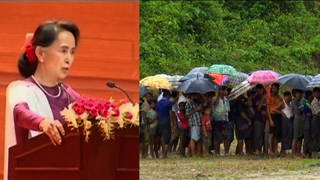Advocates Warn All Rohingya May Be Driven Out of Burma If Military's Ethnic Cleansing Continues

A humanitarian crisis continues to unfold in Burma, where more than 400,000 members of the Rohingya Muslim minority have fled the country to escape a brutal Burmese military operation. According to Human Rights Watch, tens of thousands of Rohingya homes have been burned to the ground. Some 214 Rohingya villages in Burma have been destroyed. Before-and-after satellite photos distributed by Human Rights Watch reveal that wide swaths of Rakhine state have been destroyed in recent weeks. Last week, U.N. High Commissioner for Human Rights Zeid Ra'ad al-Hussein accused the Burmese government of waging a textbook example of ethnic cleansing. On Tuesday, Human Rights Watch called on the United Nations General Assembly to condemn the Burmese military operation. Meanwhile, Burmese Nobel Peace Prize laureate Aung San Suu Kyi, who is now Burma's de facto president, is facing mounting criticism for her handling of the violence. Last year, she attended the United Nations General Assembly as Burma's much-esteemed new civilian leader. This year, she has refrained from attending the gathering, choosing to avoid questions about the Burmese military's crackdown on the Rohingya. During a nationally televised speech on Tuesday, Suu Kyi refused to blame the military or address the U.N.'s accusation of ethnic cleansing. We speak with Azeem Ibrahim, author of the book "The Rohingyas: Inside Myanmar's Hidden Genocide." He's a senior fellow at the Center for Global Policy.